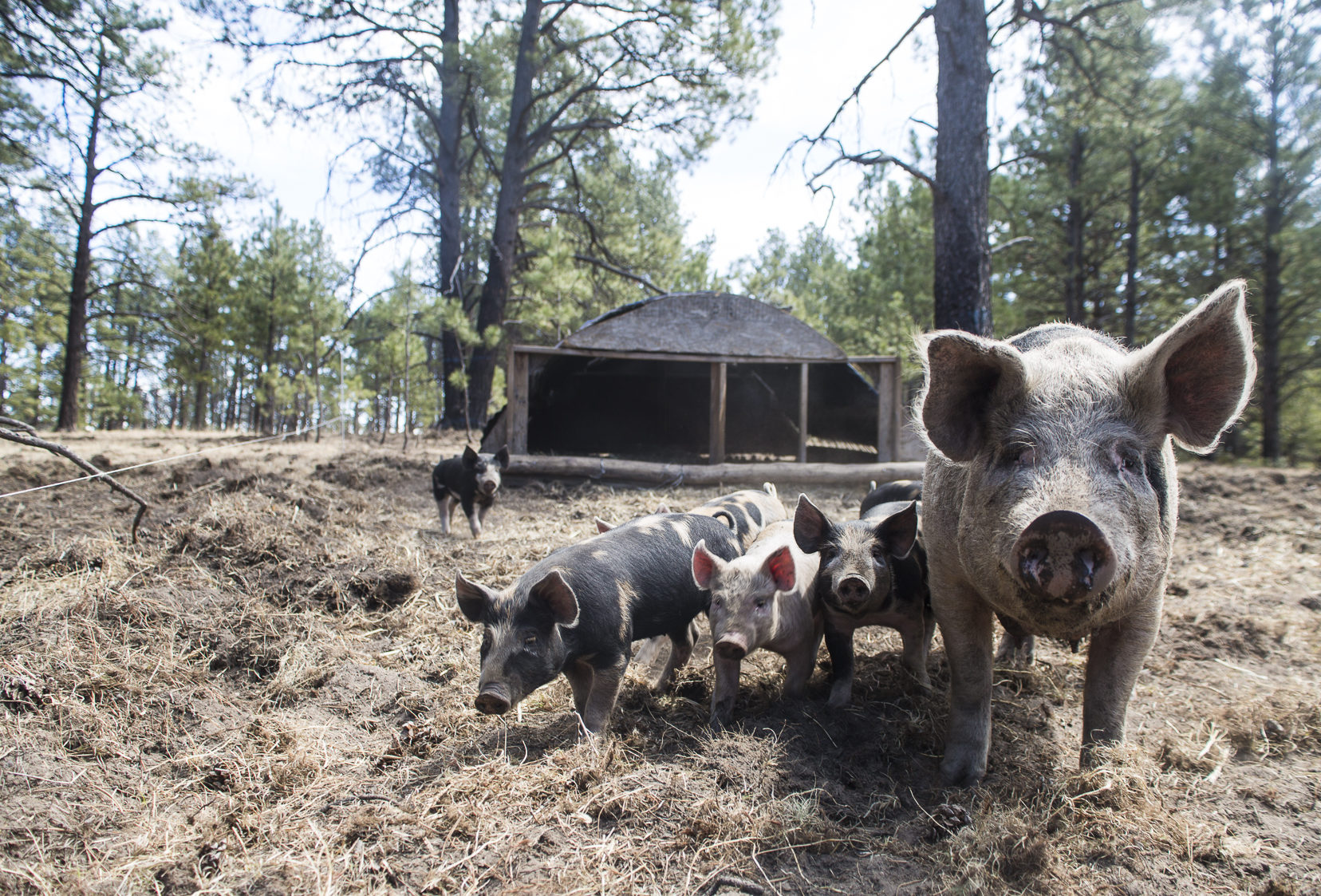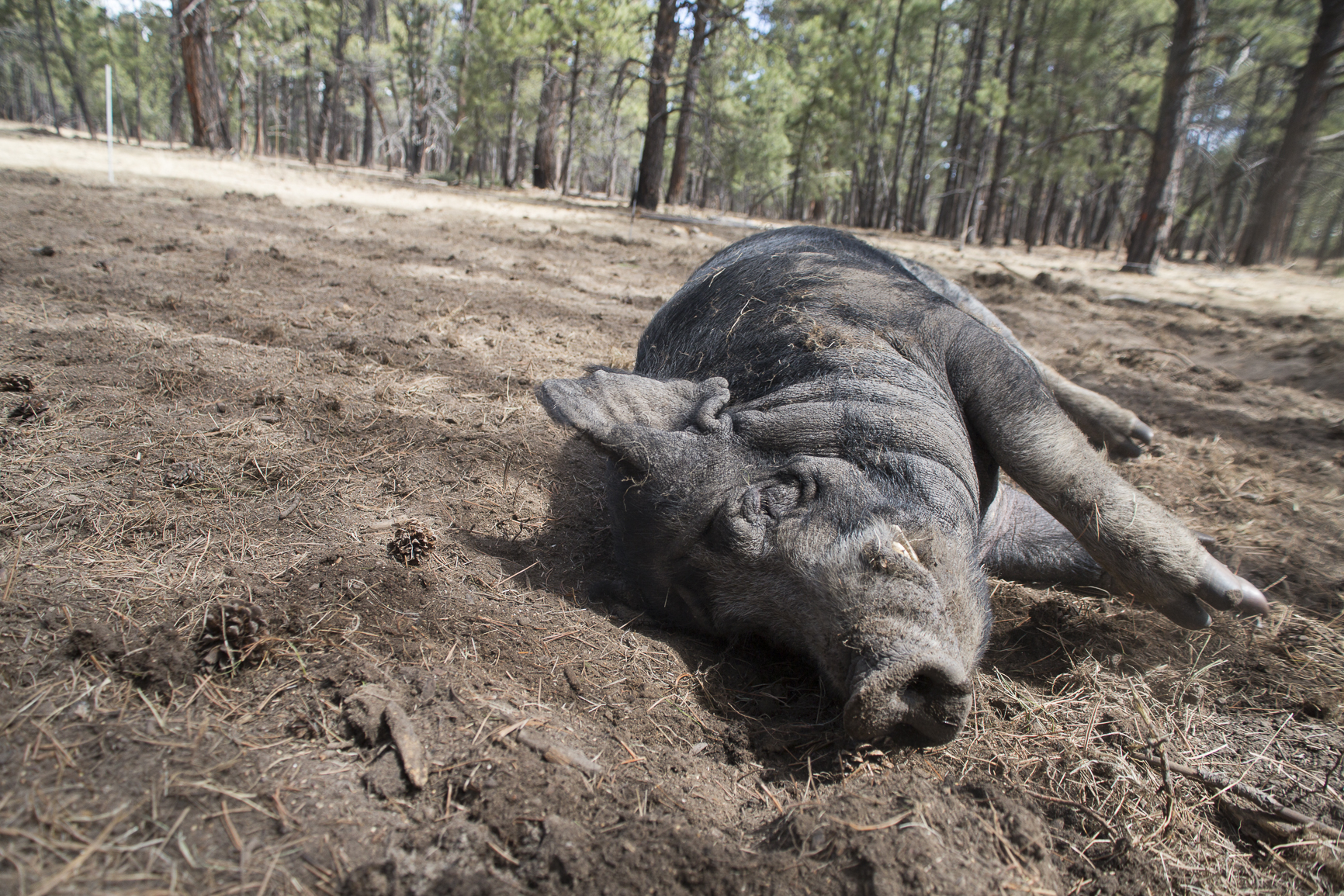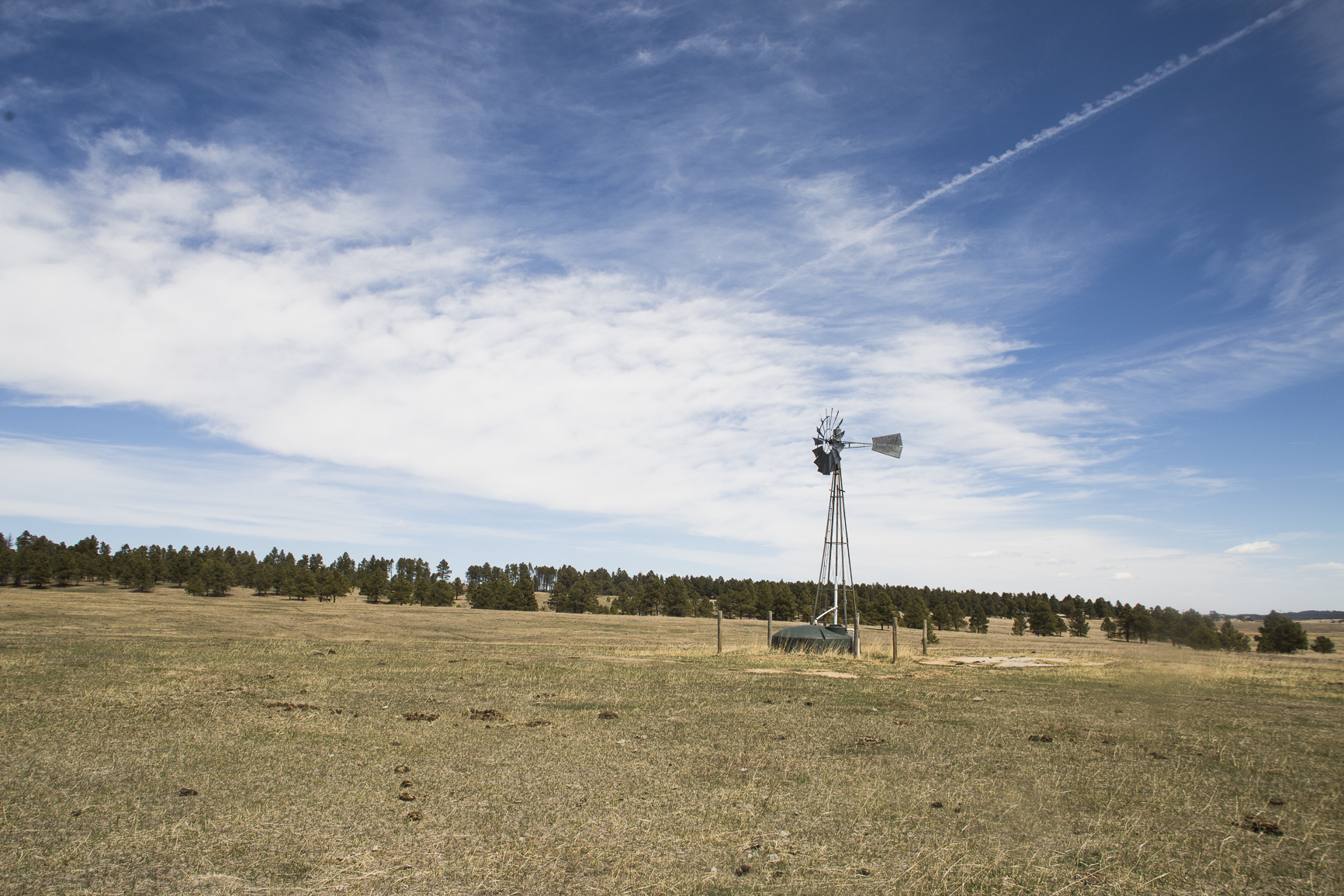This product has found its way into the hands of famed chefs at some of Denver’s highest level restaurants. Staples in the culinary scene like Potager, Hop Alley, Euclid Hall, Old Major and Urban Farmer are onboard and cooking with Corner Post Meats premium Colorado livestock, raised on naturalistic, free-range, sustainable methods. 303 Magazine took a tour of the 1500 acre farm in Black Forest, Colorado Springs to find out why and how Corner Post Meats has made its way into some of Denver’s most delicious and decorated restaurants. What we found was both heartwarming and refreshing.
The turning of seasons has happy piglets rutting between the pines and newborn calves clinging to their mothers as they graze the first green sprouts of spring on the pasture. Matt Koster — the brand ambassador for Corner Post — met us bright and early for a four-wheeler guided tour of the ranch. Upon introduction, he explained that the land is leased from the National Audubon Society who partners with High Country Land Management to help preserve nature for great plains wild birds and native species.
“Being that we are on a wild bird reserve, all of our practices on the farm are structured for the rehabilitation and preservation of this ecosystem,” explained Koster.
The Livestock
The first stop on the tour is the pig pen, or the lack thereof. The pigs on the property come in a diverse range of heritage, ranging from Mangalits to Berkshire, but there are a few things for certain; these are happy pigs and there is definitely no pig pen on this ranch. The pigs are kept in five different groups throughout the property. Their rutting and foraging are guided by nothing more than a piece of synthetic string — the pigs are left to rut and forage in the forest without the need for supervision or concrete enclosures. Corner Post is home to some of Colorado’s only free-ranging forest hogs which is one of the reasons they are highly sought after in Denver’s culinary market.
“Pigs are social animals, they really want to be next to each other all the time… we use rope as guidelines to keep groups together. Once they [the pigs] have successfully turned over an area, we open one end of the [rope] barrier and move them to another section of the forest to rehabilitate.” said Koster.
In addition to turning up the soil and fertilizing the land, the presence of pigs also aids in preventing the Pine Beetle epidemic on the property. The Ponderosa Pine — the largely predominant plant species in Black Forest — is abundant and is easily susceptible to pine beetle kill. The Pine Beetle is an invasive insect species that eats holes through vast swaths of tree communities in Colorado causing growth problems and mass tree kill. Each time a group of pigs is moved to a new area of the property, the first thing they go after is the bases of the trees where beetle grubs are found. These groups of pigs are essentially acting as natural roaming pesticide service. Hogs get up to 30 percent of their diet from foraging the land on the farm.There is no corn and no soy in their diet, allowing for the growth of healthy, happy, tasty forest going pigs.The remaining 70 percent of their diet is supplemented with locally sourced barley and grain.
The farm is also home to high altitude cattle. Just like all of the livestock on the farm, the cattle are descended from a few different lineages as to bring variety to the herd. “We don’t just breed one cow here like for instance, Wagyu or Black Angus — we populate the farm with animals that live and maintain well on the land they’re given,” said Koster. A mix of Brahman and Longhorn breeds make up a majority of the cattle on the property. These breeds are conditioned for long winters and arid summers, making them accustomed to life on the great plains. Many of the cows have horns which is something completely natural and allows a mother to protect its newborn against threats like coyotes. Although the cattle are sectioned to graze in different areas of the farm they are largely free roaming and assume a herd mentality to protect their own. We were not allowed out of the four-wheeler around the new-born calves to avoid the risk of a charging cow.
Free-ranging Colorado lamb, turkey and chicken also call Corner Post home. Being on the Audubon preserve does bring around some bigger birds of prey and Corner Post has reported peak losses of up to four to five birds a day — something that is just a part of the symbiotic relationship with the ecosystem on the preserve. In addition to a full free-range life, the animals here also enjoy a completely natural living — free of vaccinations, chemical dewormers, antibiotics and growth hormones. Every animal on the farm meets the FDA Organic standards but it seems safe to say that Corner Post Meats practices far exceed the expectations of an average organic operation and for this reason, Denver’s chefs can’t wait to put this product on their menu.
“…the team at Corner Post Meats is truly sincere and hands on. They took the time to answer my questions and educate me in livestock breeding and management. The quality of their product is top notch, knowing their commitment to ethical methods and sustainability gives me the confidence to have their meats on our menu at Urban Farmer Denver,” said Chris Starkus the Executive Chef at Urban Farmer Denver.
A Grazing Life
Corner Post Meats co-hosts a dinner and brunch series called “A Grazing Life” which invites guests to enjoy a combination of farm-raised product, the talent and limitless creativity of Colorado’s most prestigious chefs, craft cocktails and live music. The best thing about dining with Corner Post is that each experience comes complete with a five-course meal, a happy hour and a guided farm tour where guests can learn the ins and out of what truly sustainable farming looks, feels and tastes like. Your meal will be served outside, under the sky at giant community table that overlooks beautiful farmland and is topped with a glorious view of Pikes Peak
Each dinner hosts about 50 guests and each brunch is set for about 100. Seating does fill up quickly and upcoming dinners hosted by Hop Alley and the Broadmoor’s Penrose Room have already sold out for the summer. Look at the calendar on its website to find out when the ranch will host your favorite restaurant. Tickets for dinners range from $115 $135
Denver’s biggest culinary names have jumped on board with Corner Post but that certainly doesn’t mean that you as a personal chef can’t appreciate the product and support the cause for sustainable farming in your own kitchen. The ranch’s website offers an online store with access to a series of different events featured on the farm and a full line of frozen beef and poultry. If you don’t have time to make it down to Colorado Springs for dinner or a tour, follow @corner_post_meats to see daily stories from the ranch and the location of its next “Meat and Greet” series. The “meat and greet” invites customers and guests to join the ranchers for dinner at a restaurant that serves their product to have all your ranching questions answered.
The whole culture around Corner Post Meats revolves around transparency — from scheduled tours to farm-to-table dinners, the goal is getting the consumer to ask the questions “where” and “how” when it comes to meat, poultry and sustainable mile-high farming.
All Photography by Emma Pion-Berlin







